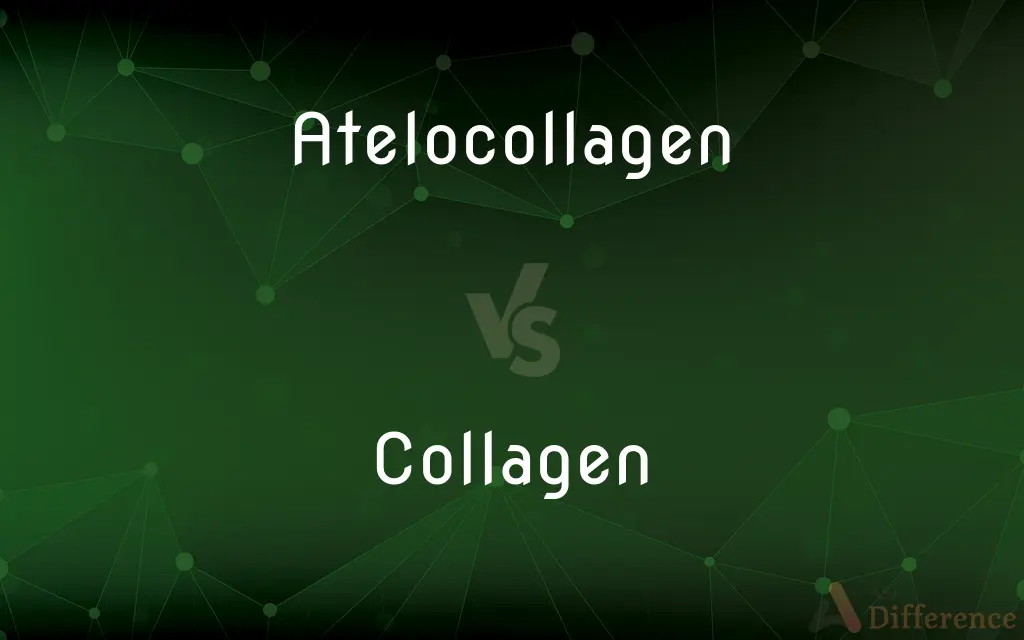Atelocollagen vs. Collagen — What's the Difference?
By Fiza Rafique & Urooj Arif — Updated on April 2, 2024
Atelocollagen minimizes immunogenic responses, ideal for biomedical applications, whereas collagen is a primary structural protein in the body, fundamental in tissue repair and regeneration.

Difference Between Atelocollagen and Collagen
Table of Contents
ADVERTISEMENT
Key Differences
Atelocollagen is a modified form of collagen, designed to reduce its immunogenic properties and enhance its suitability for medical and cosmetic applications. By removing the telopeptides from collagen, atelocollagen is less likely to trigger an immune response, making it a preferred choice for injectable treatments, tissue engineering, and as a carrier for drug delivery systems. On the other hand, collagen, found abundantly in the body, serves as the main component of connective tissues. It provides structural support to the skin, bones, ligaments, and other tissues.
While atelocollagen's modified structure is specifically designed to minimize immune reactions when used in medical treatments, collagen's natural form can sometimes lead to sensitivities or allergic reactions, particularly in medical or cosmetic procedures involving direct implantation or injection. Atelocollagen is thus engineered to retain the beneficial properties of collagen while eliminating elements that could lead to adverse immune responses.
Moreover, atelocollagen is often used in the field of regenerative medicine and cosmetic surgery due to its biocompatibility and ability to integrate seamlessly with human tissues. Collagen, in its various forms, is also utilized in these areas but is especially prominent in products aimed at enhancing skin hydration, elasticity, and overall appearance. Both substances play pivotal roles in anti-aging treatments, but atelocollagen is specifically chosen for its reduced risk of eliciting immune responses.
In terms of production and sourcing, atelocollagen is derived from collagen through a process that removes the telopeptides, which are thought to be the primary cause of immunogenic reactions. This process requires additional steps and technologies, making atelocollagen generally more expensive and specialized than collagen. Collagen, being more directly sourced from animals such as cows, pigs, and fish, is more readily available and is used in a wider range of products, including dietary supplements, beauty products, and medical materials.
Despite their differences, both atelocollagen and collagen share the fundamental property of promoting healing and regeneration in the body. Their applications, however, are tailored to their unique properties, with atelocollagen being specifically chosen for scenarios where minimizing the immune response is crucial, and collagen being widely used for its structural benefits and natural abundance in the body.
ADVERTISEMENT
Comparison Chart
Primary Use
Medical applications, cosmetic treatments to minimize immune response.
Wide range of uses including dietary supplements, beauty products, tissue repair.
Immune Response
Reduced immunogenicity due to telopeptide removal.
Can cause sensitivities or allergic reactions due to its natural form.
Application in Medicine
Preferable for injectable treatments and regenerative medicine.
Used in various medical and cosmetic procedures, not specifically designed to reduce immune responses.
Source and Production
Derived from collagen by removing telopeptides; more complex production process.
Sourced directly from animals; more straightforward production.
Cost
Generally more expensive due to additional processing.
Relatively cheaper and more accessible.
Compare with Definitions
Atelocollagen
A modified form of collagen with reduced immunogenicity, suitable for biomedical use.
Atelocollagen is used in tissue engineering to support cell growth without causing an immune response.
Collagen
A protein that provides structural support to various tissues in the body.
Collagen supplements are popular for improving skin elasticity and reducing wrinkles.
Atelocollagen
Atelocollagen's compatibility with living tissue makes it ideal for medical applications.
The biocompatible nature of atelocollagen makes it a key component in developing artificial skin.
Collagen
Collagen contributes to the density and strength of bones.
Collagen intake is associated with improved bone mineral density in older adults.
Atelocollagen
Atelocollagen's form allows for it to be used in injectable treatments.
Atelocollagen is preferred for dermal fillers due to its smooth integration into the skin.
Collagen
Collagen is often taken as a supplement to support skin, bone, and joint health.
Daily collagen supplements can help increase joint mobility and reduce pain.
Atelocollagen
Atelocollagen can be used as a carrier in drug delivery systems.
Atelocollagen helps in targeted drug delivery by encapsulating the medication and releasing it at the site of action.
Collagen
Collagen is a common ingredient in beauty products for its skin-rejuvenating properties.
Collagen creams are used to hydrate and firm the skin, reducing signs of aging.
Atelocollagen
It plays a significant role in regenerative medicine by supporting the regeneration of tissues.
Atelocollagen scaffolds are used to promote the healing of bone fractures and injuries.
Collagen
It plays a crucial role in the body's healing process.
Collagen dressings are used in wound care to promote faster healing.
Atelocollagen
A water-soluble form of collagen, used in cosmetics and for culturing cells, formed by removal of telopeptides
Collagen
Collagen () is the main structural protein in the extracellular matrix found in the body's various connective tissues. As the main component of connective tissue, it is the most abundant protein in mammals, making up from 25% to 35% of the whole-body protein content.
Collagen
The main structural protein found in skin and other connective tissues, widely used in purified form for cosmetic surgical treatments
She was given a collagen injection to smooth out wrinkles in her forehead
Vitamin C plays a vital role in the formation of collagen
Collagen
Any of a class of extracellular proteins that are composed of three coiled polypeptide chains, form strong fibers, and are the main constituents of cartilage, bone, and other connective tissues in animals.
Collagen
Material composed principally of collagen proteins. Collagen is converted into gelatin when boiled in water.
Collagen
(biochemistry) Any of more than 28 types of glycoprotein that form elongated fibers, usually found in the extracellular matrix of connective tissue.
Collagen
The chemical basis of ordinary connective tissue, as of tendons or sinews and of bone. On being boiled in water it becomes gelatin or glue.
Collagen
A fibrous scleroprotein in bone and cartilage and tendon and other connective tissue; yields gelatin on boiling
Common Curiosities
Is atelocollagen more expensive than collagen?
Yes, due to the additional processing to remove telopeptides, atelocollagen is generally more costly.
Can collagen cause allergic reactions?
Yes, collagen's natural form can sometimes lead to sensitivities or allergic reactions, especially in medical or cosmetic procedures.
How does atelocollagen differ from collagen?
Atelocollagen is engineered to minimize immune responses, making it ideal for medical applications, while collagen is a naturally occurring protein in the body.
Why is atelocollagen preferred in medical treatments?
Its reduced immunogenicity makes it safer for injectable treatments and tissue engineering.
Are there vegan sources of collagen?
True collagen is derived from animal sources, but there are vegan supplements designed to support collagen production in the body.
What makes atelocollagen suitable for regenerative medicine?
Its biocompatibility and reduced immune response make it excellent for supporting tissue regeneration.
What is atelocollagen?
Atelocollagen is collagen that has been modified to remove telopeptides, reducing its potential to cause immune reactions.
What are the main uses of collagen?
Collagen is used in dietary supplements, beauty products, and medical materials for its structural benefits.
Can both atelocollagen and collagen promote healing?
Yes, both have properties that support healing and regeneration, but their applications differ based on their immune response.
How is atelocollagen produced?
It's derived from collagen by a process that removes the telopeptides, which are responsible for most of its immunogenic effects.
Do atelocollagen and collagen have the same source?
Both are derived from animal collagen, but atelocollagen undergoes additional processing to enhance its medical applicability.
Is it safe to use collagen supplements?
Generally, yes, but it's important to choose high-quality products and consider potential allergies.
What role does collagen play in the body?
Collagen provides structural support to skin, bones, ligaments, and other tissues, essential for their strength and elasticity.
Can atelocollagen be used in drug delivery systems?
Yes, it's used as a carrier for drugs, ensuring targeted delivery and controlled release.
How can atelocollagen benefit skin health?
Its ability to integrate seamlessly with human tissues makes it ideal for cosmetic applications, promoting skin hydration and elasticity.
Share Your Discovery

Previous Comparison
Zircon vs. Zirconium
Next Comparison
Telekinetic vs. TelepathyAuthor Spotlight
Written by
Fiza RafiqueFiza Rafique is a skilled content writer at AskDifference.com, where she meticulously refines and enhances written pieces. Drawing from her vast editorial expertise, Fiza ensures clarity, accuracy, and precision in every article. Passionate about language, she continually seeks to elevate the quality of content for readers worldwide.
Co-written by
Urooj ArifUrooj is a skilled content writer at Ask Difference, known for her exceptional ability to simplify complex topics into engaging and informative content. With a passion for research and a flair for clear, concise writing, she consistently delivers articles that resonate with our diverse audience.
















































